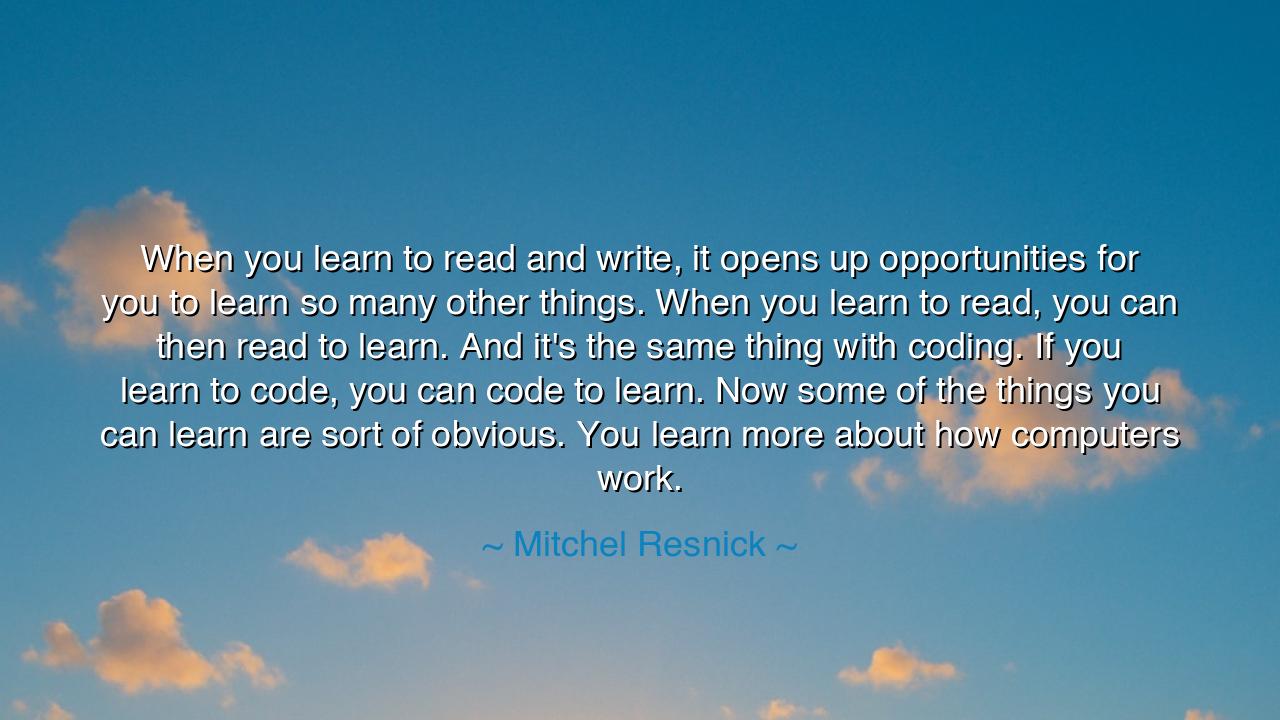
When you learn to read and write, it opens up opportunities for
When you learn to read and write, it opens up opportunities for you to learn so many other things. When you learn to read, you can then read to learn. And it's the same thing with coding. If you learn to code, you can code to learn. Now some of the things you can learn are sort of obvious. You learn more about how computers work.






"When you learn to read and write, it opens up opportunities for you to learn so many other things. When you learn to read, you can then read to learn. And it's the same thing with coding. If you learn to code, you can code to learn. Now some of the things you can learn are sort of obvious. You learn more about how computers work." – Mitchel Resnick
In the ancient days, wisdom was passed from one generation to the next, not through machines, but through words, stories, and the shared experience of the human spirit. Those who learned to read the sacred texts of the time, from the Vedas to the Scriptures, unlocked the gateway to knowledge. In the same way, Mitchel Resnick speaks of a profound truth: once you learn the basics, once you unlock the power of reading and writing, the world of learning opens to you, like a garden of endless discovery. Language becomes the bridge between you and the unknown, and the ability to read becomes the key to unlocking the vast treasures of human knowledge.
Consider, if you will, the great philosophers of the ancient world. Socrates, though not a writer himself, recognized the power of language and discourse. His philosophy lived through the words of his student Plato, whose dialogues continue to shape our understanding of the world. Through the written word, the ideas of one man traveled across time and space, touching the hearts and minds of generations. In this way, the act of learning to read and write was not just about acquiring a skill—it was about acquiring the ability to engage with the collective wisdom of all who came before. Reading and writing opened the door to a lifetime of exploration, a journey of learning that knew no bounds.
In the modern era, coding serves a similar function to that of reading and writing. It is not just a skill for those who wish to work with computers, but a tool for learning. When you learn to code, you are not merely learning a set of instructions to control a machine—you are learning how to think in a structured, logical way. It is akin to learning a new language, one that allows you to converse with machines and, in turn, understand how they function. Just as reading opens up the world of literature, philosophy, and science, coding opens up the world of technology and innovation. It gives you the ability to create, not just consume, in the ever-expanding realm of the digital world.
Consider the story of Ada Lovelace, a woman whose vision transcended the constraints of her time. In the 19th century, Ada saw the potential of Charles Babbage's Analytical Engine, a mechanical precursor to the modern computer. While others saw it as a mere calculating machine, Ada envisioned it as a tool for creating patterns and sequences. She coded for it, long before the term "coding" was even conceived, and her work laid the foundation for the idea that computers could be used for much more than arithmetic—they could be used for learning, for creativity, and for the advancement of human knowledge. Just as Ada’s learning of mathematics and the principles of computation unlocked new realms of possibility, so too does coding serve as a gateway to deeper understanding in our modern world.
Resnick's words illuminate an essential truth: learning is not a passive endeavor. When we gain the ability to read, we are not merely decoding symbols on a page—we are unlocking the potential to explore ideas, solve problems, and engage with the world in a meaningful way. The same is true for coding. Once we learn the language of computers, we do not simply manipulate machines, we are empowered to shape the future itself. The power to code becomes the power to create, to innovate, and to challenge the status quo. Technology, once a distant realm for the elite, becomes a tool for anyone willing to learn, to explore, and to build.
Thus, the lesson is clear: learning is the key to all progress. To read is to open the doors to the vast library of human knowledge. To code is to open the doors to the infinite possibilities of technology. Just as the ancients saw the written word as a gateway to wisdom, so too should we view coding as a gateway to a future we can shape. In learning to code, we learn not only the rules of machines but the principles of problem-solving, creativity, and invention.
Let this wisdom guide us: in this age of technological advancement, let us equip ourselves with the tools to learn, to create, and to engage with the world in new ways. Just as the ancients learned to read and write to pass on knowledge to future generations, so too must we learn to code, to ensure that the future is built by those who have the tools to understand and shape it. Let us not shy away from the unknown, but approach it with the same curiosity and dedication as those who first set their eyes on the written word. Learning—whether it is through the written word or the language of code—remains the most powerful tool we possess in our quest to understand and transform the world.






AAdministratorAdministrator
Welcome, honored guests. Please leave a comment, we will respond soon